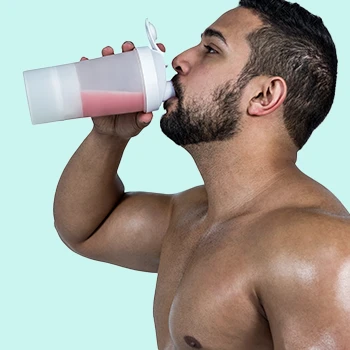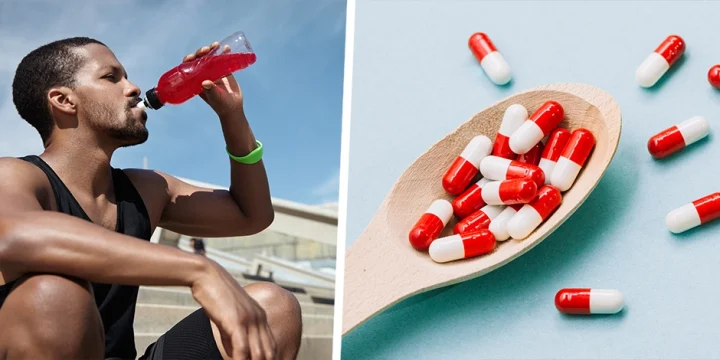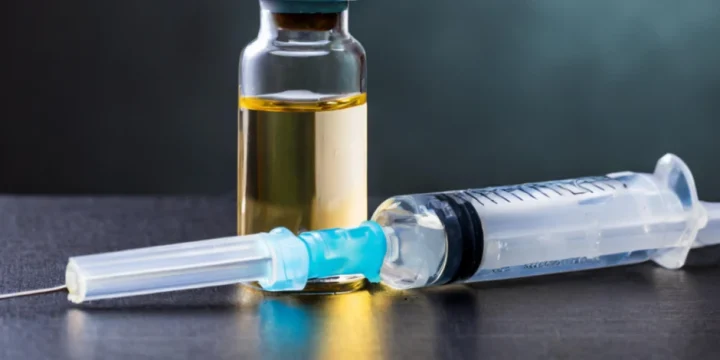What you take before your workout is just as important as what you take afterward.
Apart from your typical workout supplements, pre- and post-workouts help you build muscle, assist with weight loss, and aid in overall recovery, so I decided to synthesize my knowledge about them in this article so I can better educate my clients.
Let’s take an in-depth look at what the main differences are and why these supplements could play an essential role in your diet and fitness goals.
Quick Summary
- Pre-workout and post-workout supplements are formulated to enhance exercise performance and recovery, respectively.
- Pre-workout supplements typically contain ingredients like caffeine and beta-alanine to boost energy, while post-workouts provide proteins and amino acids for muscle repair.
- A study published in the Journal of Sports Medicine and Physical Fitness reveals that amino acid supplementation post-workout can significantly reduce muscle fatigue and soreness.
- Personally, I believe that the reliance on supplements should not overshadow the importance of whole foods, which provide a broader range of nutrients for overall health.
Pre-Workout versus Post-Workout: What’s the Difference?

The main difference between pre- and post-workout is in the name: you take the former before your workout and the latter after it.
But naturally, there are a few other differences as well:
- Pre-workouts are designed to give you an energy boost before your workout (typically achieved through the inclusion of ingredients like caffeine and beta-alanine).
- Post-workouts are designed to speed up your recovery after training by supporting muscle repair and muscle protein synthesis (often achieved through the consumption of protein-rich foods, whey protein, and essential amino acids).
- Pre-workout nutrition includes foods that fuel you before any intense physical activity and prevent glycogen depletion (glycogen is a type of sugar molecule, and it’s a primary fuel for your cells).
- A pre-workout meal is usually smaller than a post-workout meal.
Pre-workout Supplements Benefits

Drawing from my time on the pitch, I can attest that the right pre-workout supplement doesn't just fire up your energy levels; it sharpens your competitive edge.
Certain foods like PB&J, oatmeal, bananas, yogurt, and trail mix are excellent sources of carbs, which can fuel your body with the energy it needs before your workout, according to WebMD [1].
Studies, like the one published in the Nutrition Today journal, have consistently shown that for activities demanding a quick burst of energy, carbohydrates are the primary macronutrient that the body breaks down efficiently [2].
However, many gym-goers are in a time crunch, so they opt for supplements because they’re faster to consume and absorb.
If you are in this category, I would suggest you look for a pre-workout that contains taurine, caffeine, and citrulline because:
- Taurine is known for boosting athletic performance as well as nerve and heart health [3].
- Caffeine enhances physical performance and improves brain function [4].
- Citrulline boosts your athletic performance by increasing the amount of oxygen that reaches your tissues [5].
Research has shown that taking a pre-workout containing these ingredients before exercise may boost anaerobic power performance (help perform explosive and high-energy-demanding workouts) [6].
Read More: HTLT Pre-Workout 2.0 Review: A Comprehensive Analysis
Related: Is Maca a Good Pre-Workout?

Post-workout Supplements Benefits

Reflecting on my transition from soccer to MMA, I can say that post-workout supplements have been pivotal in my muscle recovery and growth, helping me to repair and build the strength needed for my sport
When you work out, your muscles experience tiny tears, which your body repairs and rebuilds.
BCAAs provide muscle-building blocks to help this process, so post-workouts are usually made from branched-chain amino acids, better known as BCAAs.
BCAAs have the potential for greater gains in muscle mass and strength during training, with no safety concerns reported for 20 g/day or less for up to 6 weeks, according to the Office of Dietary Supplements [7].
Taking amino acid supplements will decrease muscle fatigue, repair muscles, and ease muscle soreness, as per a study published in the Journal of Sports Medicine and Physical Fitness [8].
The benefits of taking a post-workout are:
- Aiding muscle repair
- Increased strength for your next workout
- Building muscle size and strength
- Faster recovery
The Best Time to Take Each

To make the most of your pre- and post-workout supplements, you should take them at the optimal time for each.
Best Time to Take Pre-workout
On average, the best time to take a pre-workout is around 30 to 45 minutes before a gym session.
However, an important thing to keep in mind here is that no exact science determines when exactly you should take your pre-workout.
That’s because the effectiveness of pre-workout depends on many factors: age, weight, height, muscle mass, rate of metabolism, and genetics.
Even controllable factors like when and how much you ate before working out can influence the efficiency of your pre-workout.
Best Time to Take Post-workout

The best time to take a post-workout is 15–30 minutes after exercising. In my peak training days, I found that slamming a post-workout shake within 30 minutes of dropping the weights gave my muscles the immediate resources they needed to start the repair process.
However, if this is not possible, try taking it within 60 minutes after your workout.
If your workout sessions are at night, I recommend taking casein because it takes hours to metabolize, so your body can recover as you slumber away [9].
I also recommend you take creatine or a protein shake within an hour after working out since it helps with muscle strength and recovery and fuels your body with essential amino acids, according to research from the Journal of the International Society of Sports Nutrition [10].
"The primary reason to eat after a workout is to replenish what’s been lost during exercise, as well as to aid in recovery. You not only want to restore depleted glycogen stores, electrolytes, and fluids. You also must work on repairing damaged muscle tissue and building lean muscle mass."
- Dr. Natasha Trentacosta, MD, Orthopaedist
The Best Way to Take Them
There doesn’t seem to be any literature that suggests the best way to take pre- and post-workouts. But here are some tips based on my experience.
- Mixing pre-workout supplements with water before exercising worked best for my clients.
- If you prefer having a pre-workout meal, load up on pre-workout foods a couple of hours before hitting the weights.
- Clients who took whey protein powders after their workout preferred mixing them with water, whereas some mixed them with milk.
- Yet, those who preferred to eat took post-workout snacks around 60 minutes after working out.
Nevertheless, it's essential to tailor these pre-workout routines to individual requirements, considering factors such as the type of sport, intensity of training, and personal metabolic responses.
This ensures that each person gets the right balance and timing that works best for them.
FAQs
Do I Need a Post-workout?
Yes, you need a post-workout so you can reap the maximum benefits from your exercise routine. Post-workout supplements or meals will aid you with muscle recovery.
Is Protein Powder Better than Pre or Post-workout Supplements?
No, protein powder isn’t necessarily better than pre or post-workout supplements. In fact, protein powder is a common ingredient both in pre and post-workouts, and it can be taken as a post-workout supplement to fuel your muscles.
References:
- https://www.webmd.com/fitness-exercise/ss/slideshow-foods-for-workout
- https://www.ncbi.nlm.nih.gov/pmc/articles/PMC5794245/
- https://www.webmd.com/vitamins/ai/ingredientmono-1024/taurine
- https://www.medicalnewstoday.com/articles/coffee-before-workout
- https://www.webmd.com/diet/health-benefits-citrulline
- https://www.ncbi.nlm.nih.gov/pmc/articles/PMC4947244/
- https://ods.od.nih.gov/factsheets/ExerciseAndAthleticPerformance-HealthProfessional/
- https://pubmed.ncbi.nlm.nih.gov/18974721/
- https://www.webmd.com/vitamins/ai/ingredientmono-1575/casein-protein
- https://jissn.biomedcentral.com/articles/10.1186/1550-2783-10-36
About The Author
You May Also Like






